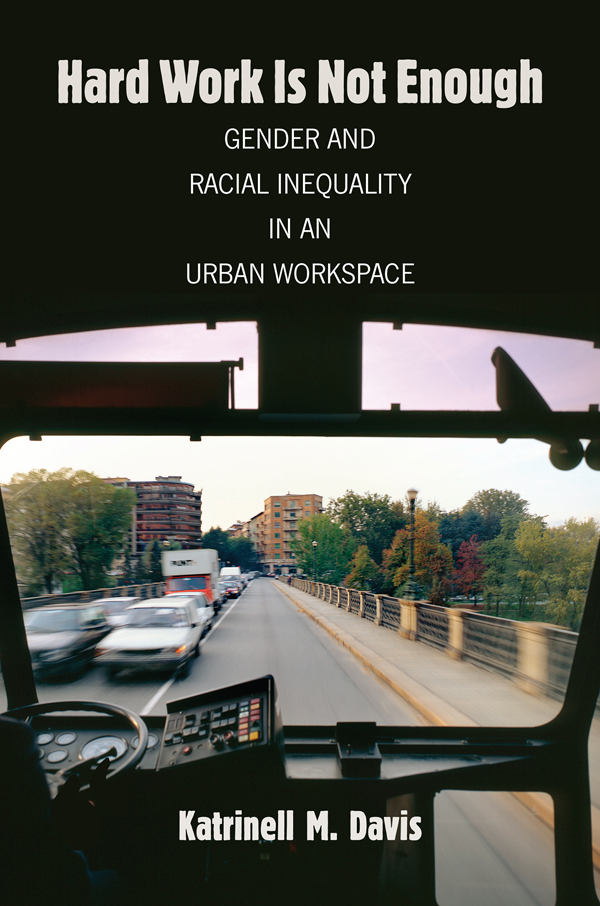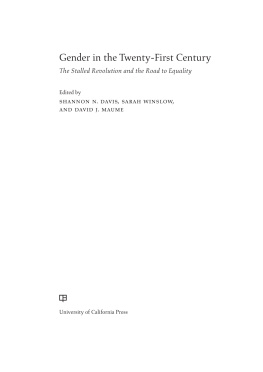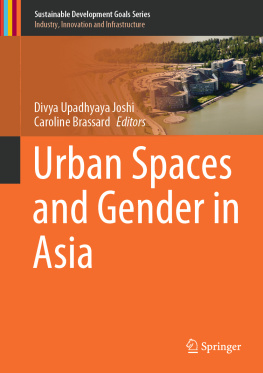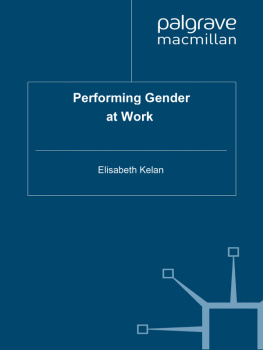Katrinell M. Davis - Hard work is not enough gender and racialinequality in an urban workspace
Here you can read online Katrinell M. Davis - Hard work is not enough gender and racialinequality in an urban workspace full text of the book (entire story) in english for free. Download pdf and epub, get meaning, cover and reviews about this ebook. City: California;Alameda County, year: 2017, publisher: University of North Carolina Press, genre: Politics. Description of the work, (preface) as well as reviews are available. Best literature library LitArk.com created for fans of good reading and offers a wide selection of genres:
Romance novel
Science fiction
Adventure
Detective
Science
History
Home and family
Prose
Art
Politics
Computer
Non-fiction
Religion
Business
Children
Humor
Choose a favorite category and find really read worthwhile books. Enjoy immersion in the world of imagination, feel the emotions of the characters or learn something new for yourself, make an fascinating discovery.

- Book:Hard work is not enough gender and racialinequality in an urban workspace
- Author:
- Publisher:University of North Carolina Press
- Genre:
- Year:2017
- City:California;Alameda County
- Rating:3 / 5
- Favourites:Add to favourites
- Your mark:
- 60
- 1
- 2
- 3
- 4
- 5
Hard work is not enough gender and racialinequality in an urban workspace: summary, description and annotation
We offer to read an annotation, description, summary or preface (depends on what the author of the book "Hard work is not enough gender and racialinequality in an urban workspace" wrote himself). If you haven't found the necessary information about the book — write in the comments, we will try to find it.
Hard work is not enough gender and racialinequality in an urban workspace — read online for free the complete book (whole text) full work
Below is the text of the book, divided by pages. System saving the place of the last page read, allows you to conveniently read the book "Hard work is not enough gender and racialinequality in an urban workspace" online for free, without having to search again every time where you left off. Put a bookmark, and you can go to the page where you finished reading at any time.
Font size:
Interval:
Bookmark:

Hard Work Is Not Enough
Hard Work Is Not Enough
Gender and Racial Inequality in an Urban Workspace
Katrinell M. Davis
The University of North Carolina Press Chapel Hill
2016 The University of North Carolina Press
All rights reserved
Manufactured in the United States of America
Set in Espinosa Nova and Alegreya Sans by Westchester Publishing Services
Cover illustration: iStockphoto.com/DarioEgidi
The University of North Carolina Press has been a member of the Green Press Initiative since 2003.
Library of Congress Cataloging-in-Publication Data
Names: Davis, Katrinell M., author.
Title: Hard work is not enough : gender and racial inequality in an urban workspace / Katrinell M. Davis.
Description: Chapel Hill : University of North Carolina Press, [2016] | Includes bibliographical references and index.
Identifiers: LCCN 2016008487 | ISBN 9781469630472 (cloth : alk. paper) | ISBN 9781469630489 (pbk : alk. paper) | ISBN 9781469630496 (ebook)
Subjects: LCSH : Transport workersCaliforniaAlameda CountySocial conditions. | Race discriminationCaliforniaAlameda County. | Sex discrimination against womenCaliforniaAlameda County. | African American womenEmploymentCaliforniaAlameda County. | Work environmentCaliforniaAlameda County.
Classification: LCC HD 8039. T 72 U 4425 2016 | DDC 331.13/30979465dc23 LC record available at http://lccn.loc.gov/2016008487
To the memory of the family members who transitioned
while I wrote this book, especially my mother ,
DONELLA M. SWAN .
I love you .
Contents
Tables
Rank of top jobs and mean incomes of high schooleducated Black women by year, 1970 and 2000
Percentage of Blacks in AC Transit by classification and year, 19731976
Percentage of State of California and Alameda County transit operators by gender and race, 1980, 1990, 2000, and 20062010
Employment by race and sex in the urban transit industry, 19401960
Employment by region, race and sex in the urban transit industry, 19401960
Urban transit industry African American operators in selected cities and other occupations, January 1945
Percentage of African Americans employed by urban transit industry by sex and occupational group, 1966
Changing status of transit companies by size of city and type of change, 19551969
Percentage of transit operators in hiring class by race, gender, year, and division, 19721978
Number of workers absent by type, division, and year, 1983 and 1986
Variations in discipline by division, 1984
Infraction variations by average discipline score and division, 1984
Workers excused from random drug and alcohol testing in 1997, 1998, and 20002001
Percentage of random drug and alcohol testing participation by job title and year, 20032009 135
Acknowledgments
Over time, many have contributed to this book. I have been fortunate to meet people during my undergraduate and graduate years who have become long-term mentors and supporters of my work. Since my time as an undergraduate Social Relations major at James Madison College, a residential college at Michigan State University, Dr. Katherine OSullivan See has motivated and supported me. I am very grateful to have met such a kind and caring guide. From graduate school in the Department of Sociology at UC Berkeley to this day, I have benefited from the support of mentors who encouraged the development of my theoretical perspectives and my efforts to produce this analysis. I wish to thank the following people for choosing to support me throughout the years as well as those who played pivotal roles at crucial times throughout the journey of completing this manuscript: Drs. Margaret Weir, Sandra S. Smith, Michael Hout, Martin Sanchez-Jankowski, Barrie Thorne, and Steven Pitts. My home while in Berkeley eventually became the Institute for the Study of Social Change, now the Institute for the Study of Societal Issues. To my ISSC/ISSI family including David Minkus, Deborah Freedman Lustig, and Christine Trost, who guided me through some really tough times, thank you for being there to pull me out of my shell and to motivate me to produce sound scholarship, while maintaining an authentic voice and a commitment to social justice.
Much of the research and insight in this book was developed during my time as a Postdoctoral Fellow at the National Poverty Center at the University of Michigan between 2011 and 2013. In this space, I was able to sort through the archival data I gathered since 2008 and focus on this manuscript with excellent resources and mentors at my disposal. While a good share of my time was spent in local restaurants where hot coffee and decent snacks were available at a modest cost, I also had the privilege of joining workgroups within the University of Michigan where I felt supported and had the opportunity to present research and receive helpful feedback from seasoned and emerging scholars. Throughout my time as an NPC Postdoctoral Fellow, I have to thank the following people for their guidance, kindness, and support: Drs. Sheldon Danziger, Sandra Danziger, Howard Kimeldorf, NPC staff and colleagues, in addition to my Emerging Scholars Interdisciplinary Network colleagues, including Drs. Sean Joe, Maria Johnson, Brandon Respress, and Ola Rostant. I also have to thank colleagues that I met through my participation in write-ins hosted by the Women of Color in the Academy Project, a campus-wide faculty network at the University of Michigan that is committed to promoting the work of women of color scholars.
My leave at the NPC was supported by the Joan Smith Faculty Research Support Award that I secured from the University of Vermont. I also benefited from the support of colleagues within the Department of Sociology at the University of Vermont as well as colleagues within this academic community who read segments of this manuscript and provided key insight and guidance. Big thanks to Drs. Beth Mintz, Elaine McCrate, and Stephanie Seguino for their help during crucial phases throughout this project.
While I had great guides and abundant support throughout the process of writing this book, this book would not exist if I hadnt met the women who chose to share their stories with me and who motivated me to take a closer look at their working conditions. I cannot be more thankful for their time, honesty, and kindness. I also wish to thank the archivists and staff at the following research centers, who helped me gather data: Labor Archives and Research Center at San Francisco State University; Tamiment Library and Robert F. Wagner Labor Archives at New York State University; the Bancroft Library and the Institute of Transportation Studies Library at the University of California, Berkeley; and the National Archives and Records Administration at San Francisco in San Bruno, California. I gained a great deal of support from their respective suggestions, research assistance, and professionalism. I am also grateful to have worked with copy editors Abigail Carroll and Letta Page, a great staff at the University of North Carolina Press, especially acquisitions editor, Joseph Parsons, as well as the readers who reviewed the manuscript and provided invaluable observations and suggestions.
Finally, I am thankful for the support I received from family and friends who supported me throughout this process. In particular, I thank my maternal grandparents for providing a compass and my mother, Donella M. Swan, for teaching me how to work hard and for moving to the East Bay for one year to watch my children while I was busy conducting interviews and analyzing data. I want to thank my cousins Joe and Lisa, for their hospitality throughout my stay as an NPC Fellow in Southeastern Michigan. To Dr. Libby Lewis, thank you for your valuable suggestions and persistent support. I appreciate your encouragement throughout this journey. To my kids, Kaitlyn and Elijah, thank you for your patience, kindness, and love. You guys motivate and challenge me to offer my best. And to Taj, my husband and partner of many years, who has supported and covered me through it all, thank you for being you and being there for me.
Font size:
Interval:
Bookmark:
Similar books «Hard work is not enough gender and racialinequality in an urban workspace»
Look at similar books to Hard work is not enough gender and racialinequality in an urban workspace. We have selected literature similar in name and meaning in the hope of providing readers with more options to find new, interesting, not yet read works.
Discussion, reviews of the book Hard work is not enough gender and racialinequality in an urban workspace and just readers' own opinions. Leave your comments, write what you think about the work, its meaning or the main characters. Specify what exactly you liked and what you didn't like, and why you think so.







